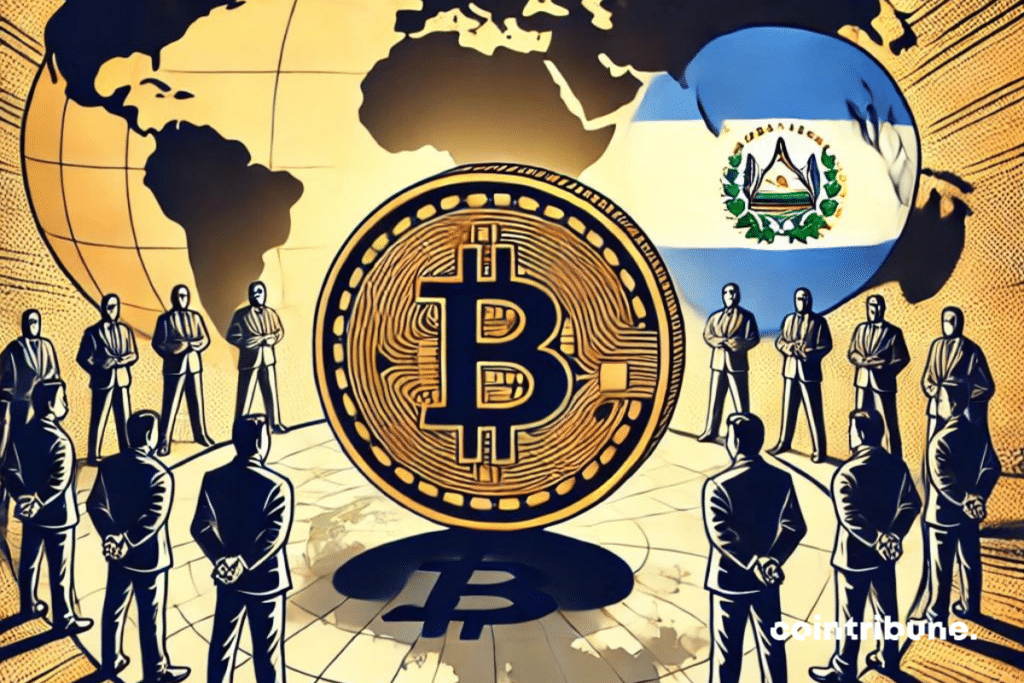Legal Bitcoin In El Salvador: The IMF Launches A New Offensive!
As cryptocurrencies reshape the global financial landscape, their adoption by nation-states remains a sensitive topic. El Salvador, the first country to recognize Bitcoin as legal tender in 2021, continues to attract international regulators’ attention. Indeed, this bold initiative now faces significant resistance. The International Monetary Fund (IMF), closely monitoring the economic implications of this adoption, is intensifying its calls for a revision of the Bitcoin legislation in this country.

The IMF Calls for a Revision of El Salvador’s Bitcoin Policies
During a press conference held on October 3, 2024, Julie Kozack, the IMF’s communications director, reaffirmed the institution’s concerns over El Salvador’s pro-Bitcoin policy. The IMF recommends “a narrowing of the scope of the Bitcoin law, as well as an enhancement of the regulatory framework and supervision of the Bitcoin ecosystem in the country,” specifies the latter. These suggestions aim to minimize the risks that this adoption could pose to the Salvadoran economy, especially the public sector’s exposure to Bitcoin volatility. Indeed, these statements are the latest in a long series of pressures exerted on the Salvadoran government since the adoption of Bitcoin as legal tender.
The IMF has often criticized this approach. For the institution, the risks associated with such a volatile currency could undermine the country’s economic stability. Although some of these fears have not yet materialized, the international financial institution remains vigilant. El Salvador, whose GDP growth hovers around 3% per year, still has to repay approximately 144 million dollars in loans contracted with the IMF, leaving little room for the state to take financial risks without increased surveillance.
Growing Tensions Around Financial Sovereignty
Despite repeated criticisms from the IMF, El Salvador has stayed the course on its Bitcoin policy. However, these pressures go beyond recommendations on regulation. More broadly, the IMF seems hostile to the idea of widespread adoption of state-uncontrolled cryptocurrencies like Bitcoin. This mistrust is reinforced by the active promotion of central bank digital currencies (CBDCs), which the institution advocates as more stable and better-regulated alternatives. Moreover, the IMF is currently pushing its “REDI” framework to encourage countries to develop and adopt CBDCs, a clear signal of the direction the institution wants to take in response to decentralized cryptocurrencies.
In March 2024, the IMF had already suggested that countries like Pakistan tax capital gains from cryptos for additional funding. Currently, the institution has proposed taxing the energy used for crypto mining, a measure that could seriously impact the sector’s economy. These initiatives illustrate the IMF’s growing desire to control the use of cryptocurrencies and curb their unregulated adoption. If El Salvador persists in its path, it could lead to consequences on its relationship with international financial institutions, and even impact its public finances.
The confrontation between El Salvador and the IMF highlights a broader issue: that of states’ financial sovereignty faced with international regulations in the crypto era. While El Salvador seems ready to stay on course despite the IMF’s recommendations, the future of this Bitcoin legalization policy remains uncertain. If the country persists, it could pave the way for other nations looking to adopt similar policies, but at the cost of increased tensions with major financial institutions.
Maximize your Cointribune experience with our "Read to Earn" program! For every article you read, earn points and access exclusive rewards. Sign up now and start earning benefits.
Diplômé de Sciences Po Toulouse et titulaire d'une certification consultant blockchain délivrée par Alyra, j'ai rejoint l'aventure Cointribune en 2019. Convaincu du potentiel de la blockchain pour transformer de nombreux secteurs de l'économie, j'ai pris l'engagement de sensibiliser et d'informer le grand public sur cet écosystème en constante évolution. Mon objectif est de permettre à chacun de mieux comprendre la blockchain et de saisir les opportunités qu'elle offre. Je m'efforce chaque jour de fournir une analyse objective de l'actualité, de décrypter les tendances du marché, de relayer les dernières innovations technologiques et de mettre en perspective les enjeux économiques et sociétaux de cette révolution en marche.
The views, thoughts, and opinions expressed in this article belong solely to the author, and should not be taken as investment advice. Do your own research before taking any investment decisions.